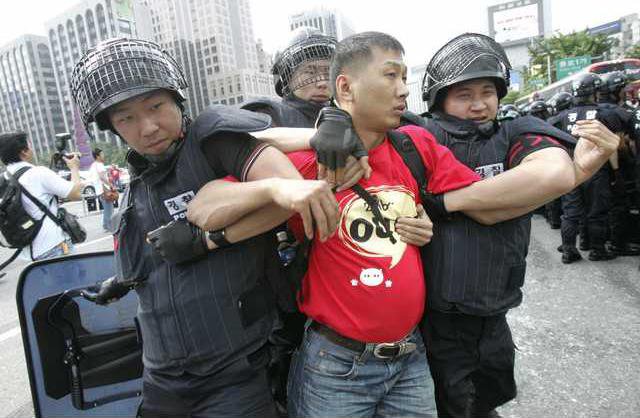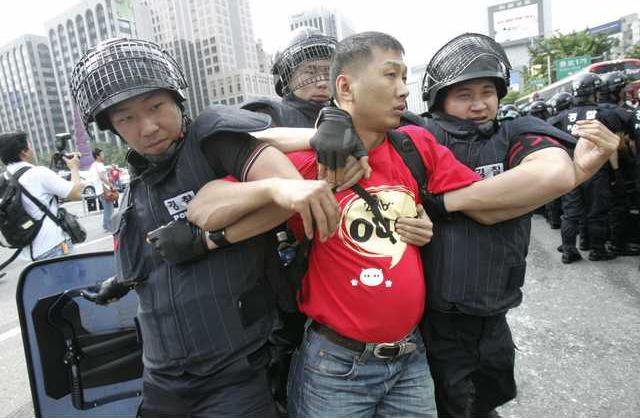SEOUL, South Korea — Humbled by weeks of anti-government protests, South Korea’s president said Wednesday his administration would seek to make a new start as one of his ministers again rejected calls to renegotiate a U.S. beef deal that helped spark the rallies.
Lee Myung-bak took office in February, but his popularity sank over botched political appointments and privatization plans. An April deal to resume U.S. beef imports caused simmering public anger to boil over due to a perception that he failed to consult the public.
Weeks of rallies culminated in a gathering of some 80,000 people Tuesday in Seoul, the largest protest so far, where barricades of shipping containers blocked crowds from marching to the presidential Blue House.
Still, officials in Lee’s government stood firm Wednesday in refusing protesters’ calls to renegotiate the beef deal.
‘‘We’re not considering a renegotiation,’’ South Korean Deputy Trade Minister Ahn Ho-young told reporters. ‘‘If we break our promise, the consequences are enormous. South Korea will become an unreliable country.’’
South Korea was the third-largest overseas customer for American beef until it banned imports after a case of mad cow disease, the first of three confirmed in the United States, was detected in 2003. Protesters contend the import deal doesn’t do enough to address their health concerns.
Lee was still weighing whether to accept the resignations of his entire Cabinet, which offered to step down Tuesday to help stem the political crisis.
However, Lee told businesspeople during a meeting at the presidential office that he was concerned the resignations might cause ‘‘a vacuum in state affairs’’ as the country faces rising oil prices and other economic difficulties.
Local media reports say Lee will reshuffle a few key ministers connected to the beef issue, which would not affect his ability to serve his five-year term. The South Korean political system vests strong authority in the president’s office.
Still, he pledged that ‘‘the government intends to make a start with a new determination.’’
As one way to restore his credibility and mandate, some media have reported that Lee is considering naming as prime minister his popular chief rival in the ruling party, Park Geun-hye.
The daughter of assassinated military ruler President Park Chung-hee, she came in second to Lee in the conservative Grand National Party’s presidential primary last year.
Such a move could be likened to U.S. presidential candidate Barack Obama choosing Hillary Rodham Clinton as vice president.
Presidential spokesman Lee Dong-kwan said nothing has been decided in the Cabinet reshuffle, though Park’s appointment was one of the ideas under consideration.
Tuesday’s protest was staged as part of nationwide rallies tied to the anniversary of pro-democracy protests in 1987.
Lee was arrested in 1964 as an anti-government protester. He got a suspended sentence, a criminal record that he once feared would prevent him from getting an entry-level job at Hyundai at the start of his salaryman-to-CEO success story.
‘‘I had a lot of mixed feelings watching last night’s street rallies,’’ Lee said. ‘‘I myself participated in pro-democracy activities as a student in the past.’’
Lee agreed to the beef deal in April as part of his campaign pledge to foster warmer ties with Washington and also to help aid passage in the U.S. Congress of a broader free-trade agreement with the United States.
Key American lawmakers had said they would not vote in favor of the free-trade deal — which also needs to be approved by South Korea’s legislature — without a reopening of South Korean markets to American beef.
Lee Myung-bak took office in February, but his popularity sank over botched political appointments and privatization plans. An April deal to resume U.S. beef imports caused simmering public anger to boil over due to a perception that he failed to consult the public.
Weeks of rallies culminated in a gathering of some 80,000 people Tuesday in Seoul, the largest protest so far, where barricades of shipping containers blocked crowds from marching to the presidential Blue House.
Still, officials in Lee’s government stood firm Wednesday in refusing protesters’ calls to renegotiate the beef deal.
‘‘We’re not considering a renegotiation,’’ South Korean Deputy Trade Minister Ahn Ho-young told reporters. ‘‘If we break our promise, the consequences are enormous. South Korea will become an unreliable country.’’
South Korea was the third-largest overseas customer for American beef until it banned imports after a case of mad cow disease, the first of three confirmed in the United States, was detected in 2003. Protesters contend the import deal doesn’t do enough to address their health concerns.
Lee was still weighing whether to accept the resignations of his entire Cabinet, which offered to step down Tuesday to help stem the political crisis.
However, Lee told businesspeople during a meeting at the presidential office that he was concerned the resignations might cause ‘‘a vacuum in state affairs’’ as the country faces rising oil prices and other economic difficulties.
Local media reports say Lee will reshuffle a few key ministers connected to the beef issue, which would not affect his ability to serve his five-year term. The South Korean political system vests strong authority in the president’s office.
Still, he pledged that ‘‘the government intends to make a start with a new determination.’’
As one way to restore his credibility and mandate, some media have reported that Lee is considering naming as prime minister his popular chief rival in the ruling party, Park Geun-hye.
The daughter of assassinated military ruler President Park Chung-hee, she came in second to Lee in the conservative Grand National Party’s presidential primary last year.
Such a move could be likened to U.S. presidential candidate Barack Obama choosing Hillary Rodham Clinton as vice president.
Presidential spokesman Lee Dong-kwan said nothing has been decided in the Cabinet reshuffle, though Park’s appointment was one of the ideas under consideration.
Tuesday’s protest was staged as part of nationwide rallies tied to the anniversary of pro-democracy protests in 1987.
Lee was arrested in 1964 as an anti-government protester. He got a suspended sentence, a criminal record that he once feared would prevent him from getting an entry-level job at Hyundai at the start of his salaryman-to-CEO success story.
‘‘I had a lot of mixed feelings watching last night’s street rallies,’’ Lee said. ‘‘I myself participated in pro-democracy activities as a student in the past.’’
Lee agreed to the beef deal in April as part of his campaign pledge to foster warmer ties with Washington and also to help aid passage in the U.S. Congress of a broader free-trade agreement with the United States.
Key American lawmakers had said they would not vote in favor of the free-trade deal — which also needs to be approved by South Korea’s legislature — without a reopening of South Korean markets to American beef.

